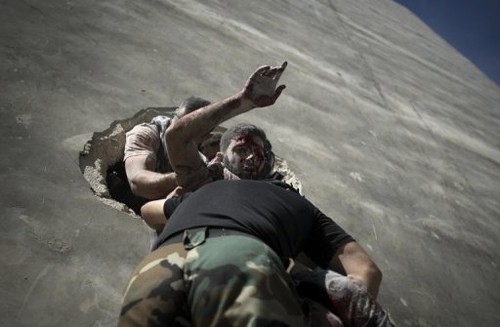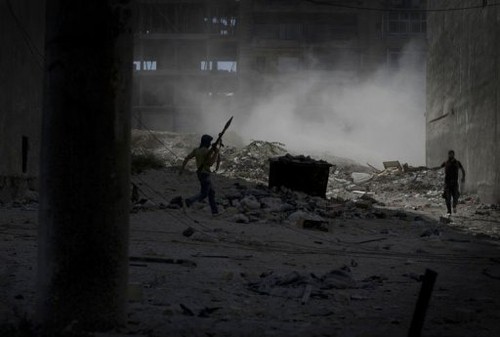(VOVworld)- Two bombs struck the Syrian army headquarters in the heart of Damascus on Wednesday while efforts were being made to find a solution to the political crisis in Syria at the annual session of the UN General Assembly in New York. The attack took place as the international community failed once again to find a diplomatic solution to the crisis.
The attack against Syrian army headquarter by the Syrian opposition party was the second in the last two days. Though the Syrian government reported that the damage was slight and no military officers were killed, this attack was reminiscent of the bomb attack at the National Security Agency a month ago, which killed 4 top security officers.

Source AFP |
Syria has topped the agenda at many international conferences but after 18 months, all initiatives and political solutions have fallen short. Some analysts say the failures due to the Syrian government’s violating international commitments while others blamed the opposition forces for violating cease-fire agreements. But, a central reason has been the lack of international consensus.
The 6-point peace plan initiated by former UN and Arab League Envoy Kofi Annan received support from all parties involved. However, it lacked a clear mechanism for enforcement and revealed that some countries were biased toward one side in the conflict. To press President Bashar Al Assad to give up power, France and several Arab countries have repeatedly called on the opposition party in Syria to set up an interim government, but the US strongly opposed this idea. Despite supporting President Al Assad’s departure, Washington criticized France for being too hasty and not coordinating with other countries in dealing with the issue. According to Washington, it’s too soon to set up an interim government in Syria when the opposition party has not reached consensus a the transitional plan. Washington wanted stronger penalties against the Syrian government and has been trying to provide military support to the opposition party. Though the West and the Arab league have repeatedly called on Al Assad to resign, none of them has officially recognized the opposition party as a legal institution. Some countries in the region have established a channel via bases in Turkey to provide weapons to the opposition party. The UN Security Council has also called on the President to resign, but has faced Russian and Chinese vetos. Those two countries support diplomatic negotiations and oppose both military intervention and economic sanctions. Their firm stance was demonstrated on Monday when the UN Security Council considered a Morocco initiated resolution asking President Al Assad to resign and cede power to the Vice President. The new UN and Arab league envoy Lakhdar Brahimi revealed he is drafting a plan to end the deadlock but said he needs more discussion with the parties involved to complete it. No one knows how feasible his plan will be or whether it can be combined with Kofi Annan’s plan. But, the public is still hopeful that a political solution can be worked out at the UN General Assembly session.

Source: AFP |
While the international community seeks way to end the conflict, Syria faces a food crisis due to collapsing food production. People are afraid to go to the hospital despite being injured, children no longer go to school because they are either damaged or being used as homeless shelters. The wave of refugees is rising. The situation has become so serious that Brahimi, in a closed meeting of the UN General Assembly yesterday, said the situation in Syria is threatening world peace.
When and how will the international community witness the end of the violence in Syria? This question seems to be unanswerable due to differences within the UN Security Council.
Anh Huyen